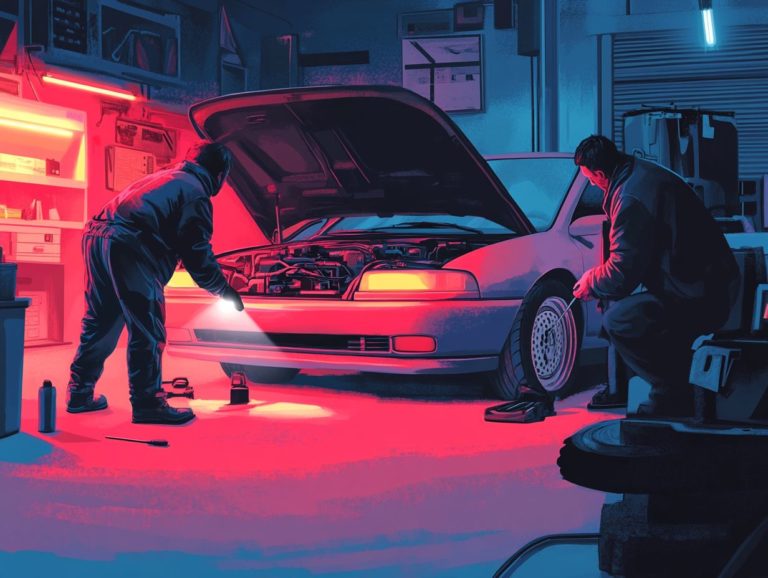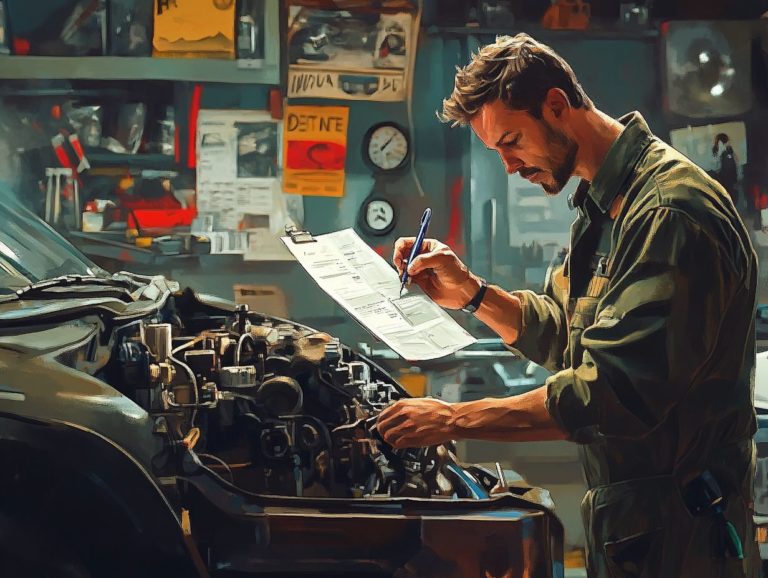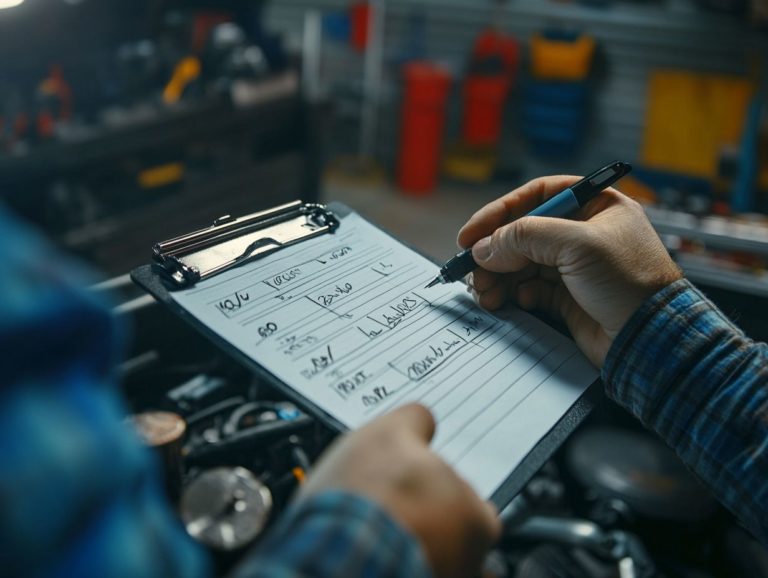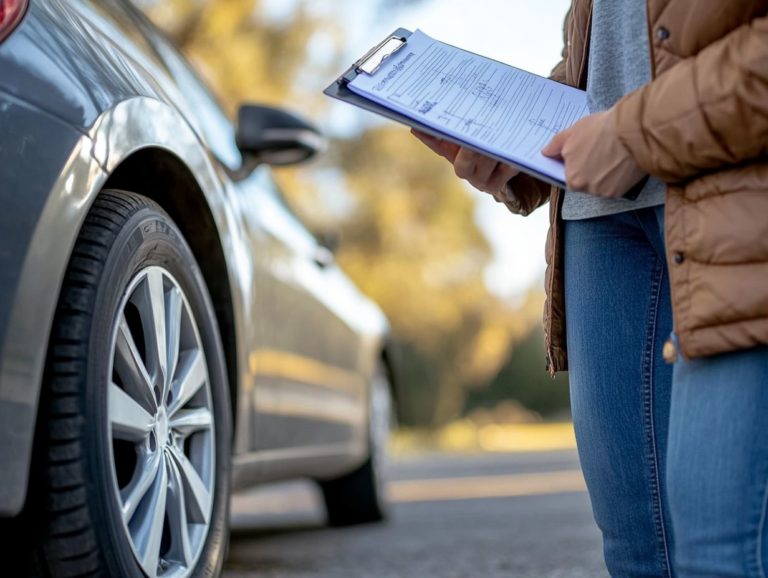How to Conduct a Mobile Car Inspection
When it comes to buying or selling a vehicle, getting a mobile car inspection can truly be a game-changer for you. It helps identify potential issues and provides you with peace of mind regarding your investment.
This guide walks you through the entire inspection process, highlighting the benefits of inspections, what you need to prepare, and delivering detailed, step-by-step checks for the exterior, interior, and engine.
You will also learn how to evaluate your vehicle’s performance on the road.
Ready to get your car in top shape? Let s jump right in!
Contents
Key Takeaways:
Getting a mobile car inspection ensures safety and can save you money in the long run. Proper preparation, including bringing necessary tools and planning the inspection, is crucial for success. Thoroughly checking the exterior, interior, under the hood, and taking a road test gives you a comprehensive understanding of the car’s condition.
Why Conduct a Mobile Car Inspection?
A mobile car inspection is essential for used car buyers. It helps ensure your purchase is in optimal condition and free from hidden issues that could lead to costly repairs later on. To learn more, consider understanding the car inspection process.
Opting for a reliable inspection service, like Lemon Squad, offers you peace of mind with a comprehensive vehicle assessment right at your location. This means you can make informed decisions without the inconvenience of a dealership visit.
An independent inspection can uncover vital information about the car’s history and current condition, enabling you to sidestep the common pitfalls often associated with buying used vehicles.
Benefits and Importance
The advantages of conducting a thorough car inspection before finalizing your used car purchase are immense. It provides invaluable insights into the vehicle’s mechanical integrity and overall quality, shielding you from potential financial headaches down the road.
Beyond revealing hidden problems, a comprehensive inspection underscores the significance of a vehicle history report, which outlines any previous accidents or maintenance. This information is essential for making informed decisions.
Diagnostic scans check the performance of important parts like the engine and transmission, ensuring that the major systems are operating smoothly. Grasping these aspects can lead you to more reliable transportation, peace of mind, and even potential savings on future repairs.
By prioritizing inspections, you can approach your purchase with confidence, knowing you ve taken all the necessary steps to protect your investment.
Preparing for the Inspection
Preparing for a pre-purchase inspection is crucial for you as a car buyer, ensuring that the evaluation of a used vehicle goes smoothly and successfully. This process enables you to uncover potential issues, allowing you to make a well-informed financial commitment before sealing the deal.
What to Bring and How to Plan
When you’re planning for a mobile car inspection, it’s wise to bring along an inspection checklist. This should include essential steps like reviewing the vehicle’s history and assessing its current condition with the expertise of an independent mechanic.
Gather any relevant documents, such as the registration, maintenance records, and any existing warranties. Having this information readily available not only facilitates the inspection but also promotes transparency between you and the seller.
It s equally important to establish a specific time and location for the inspection. Selecting a well-lit, accessible area will enhance visibility and make the process easier for the inspector.
Coordinate with the mechanic beforehand to ensure they understand the car’s details, allowing for a thorough and accurate evaluation. Familiarizing yourself with what to expect during a used car inspection can streamline the process and help you arrive at a more informed decision, giving you peace of mind before making a big financial commitment.
Exterior Inspection
The exterior inspection of a used car is a pivotal step in your overall evaluation process. It enables you to discern visible signs of wear, assess any accident damage, and identify potential issues with vital components such as tire tread and steering suspension.
Taking the time to conduct this thorough examination can significantly influence your buying decision and help ensure you make a well-informed investment.
Checking for Damage and Wear
During your exterior inspection, it s crucial to examine both cosmetic flaws and functional damage. These elements can significantly influence the reliability of the vehicle and its market value.
Your thorough evaluation should include checking the paint for scratches, dents, or rust. Also, assess the condition of the windows and headlights, as these are vital for visibility and safety.
Watch the alignment of body panels; this can uncover past accidents or hidden structural problems. Ensuring that all seals and trims are intact is essential to prevent water leaks, which could lead to more significant damage down the road.
By relying on a reputable inspection service, you boost the accuracy of identifying these potential issues. This also gives you peace of mind, whether you re the owner or a prospective buyer.
Interior Inspection
An interior inspection is essential for evaluating the overall condition of your vehicle.
Pay close attention to factors such as cleanliness and the functionality of controls. Also, look for any signs of wear, as these can reveal potential maintenance costs down the road.
Assessing the Condition of the Interior
When assessing the condition of a vehicle s interior, focus on key features like upholstery quality and dashboard functionality. These elements greatly contribute to both comfort and resale value.
As a potential buyer, carefully check the seats for any signs of wear or damage that could affect long-term comfort. The functionality of controls like air conditioning and the sound system also significantly impacts your driving experience.
It s crucial to evaluate the fit and finish of the interior materials. Look out for scratches or scuffs that might indicate neglect.
Don t overlook the vehicle s odor; a musty smell could signal hidden issues, while a fresh scent often reflects a well-maintained interior. Making these assessments will ensure you make an informed decision on your next purchase.
Under the Hood Inspection
The under-the-hood inspection is a vital aspect of assessing a used car. It centers on key elements such as the engine, fluid levels, and belts, all essential for determining whether the vehicle is mechanically sound.
Examining Engine, Fluids, and Belts
When you examine the engine, fluids, and belts, look for leaks and ensure proper fluid levels. Assess the overall condition of key components that can significantly influence maintenance costs over time.
Regular inspections allow you to identify potential issues early and enhance your vehicle’s performance. As you inspect the engine, develop a keen eye for spotting fluid leaks. If ignored, these can escalate into major repair headaches.
Fluid levels refer to the amounts of essential liquids like oil and coolant that keep the engine running smoothly. Keeping track of these levels is vital to prevent overheating and ensure smooth operation.
Evaluating the condition of belts is crucial, as worn or frayed belts can lead to breakdowns or malfunctions of engine components. Prioritize these checks to sidestep hefty repair bills and extend your car s lifespan.
Road Test
Conducting a road test is an essential step in the used car inspection process. It enables you to assess the vehicle’s performance, handling, and any potential issues that might arise during real-world driving conditions.
This hands-on evaluation is crucial for making an informed decision about your purchase.
Evaluating the Performance and Handling
Evaluating the performance and handling during your road test involves assessing key factors such as acceleration and braking systems. Also, observe how the vehicle responds to various driving conditions.
You must examine the steering responsiveness this could make or break your driving experience! The stability of the vehicle under different load conditions and its ability to maintain control across various surfaces are also critical elements that contribute to its overall usability.
Fuel efficiency during the road test offers valuable insights into long-term running costs. By closely monitoring these performance metrics, you gain a clearer understanding of the vehicle’s capabilities and ensure it aligns with your personal driving needs.
Get your car inspected today to avoid costly repairs later!
Final Steps and Recommendations
After your inspection, review the report carefully. This step is vital.
This document outlines findings related to repair costs and the vehicle’s condition. It also includes actionable recommendations for potential buyers. Taking time to analyze this information enables informed decisions moving forward.
Completing the Inspection and Next Steps
Completing the inspection and understanding the next steps can significantly influence your negotiations and decision-making process when buying a used car.
Once you have the inspection report in hand, review the findings diligently. Note any significant issues, as these details can be crucial during price negotiations.
Consider obtaining repair estimates from local mechanics. This information can provide you with a valuable advantage in discussions with the seller.
If the inspection reveals minor issues, understanding their potential impact on the vehicle’s overall performance helps decide whether to negotiate a lower price or request repairs before finalizing the deal.
Ultimately, evaluating the report’s insights in relation to the vehicle’s overall condition will guide you toward a well-informed decision on whether to proceed with the purchase.
Frequently Asked Questions
What is a mobile car inspection?
A mobile car inspection is a thorough examination of a vehicle’s condition. A certified mechanic or car inspector typically performs it at a location convenient for the client, such as their home or workplace. To ensure everything goes smoothly, it’s helpful to know how to prepare for a car inspection appointment.
What are the benefits of a mobile car inspection?
A mobile car inspection offers convenience and flexibility. The inspection can occur at a location and time that suits you. To ensure everything is in order, it’s helpful to know how to prepare your car for inspection. This approach allows for a more accurate assessment of the car’s condition, as it takes place in its usual operating environment.
What should I expect during a mobile car inspection?
During a mobile car inspection, a certified inspector will examine the exterior and interior of the vehicle. They will check the engine, tires, brakes, and other vital components, noting any potential issues or concerns. To ensure you get the most out of this process, refer to how to make the most of your car inspection. They may also conduct a test drive to evaluate the car’s performance.
How long does a mobile car inspection take?
The duration of a mobile car inspection varies based on the vehicle’s condition and the inspector’s thoroughness. On average, it takes 1-2 hours to complete, but knowing how to use a car inspection checklist effectively can help streamline the process.
Do I need to be present during the mobile car inspection?
It is not necessary for the car owner to be present during the mobile car inspection. However, being present is recommended to ask questions and discuss findings with the inspector.
What should I do after the mobile car inspection?
After the mobile car inspection, the inspector will provide a detailed report of their findings and recommendations. Be sure to review this report carefully and follow the best practices for a car inspection to address any potential issues before purchasing the vehicle.





